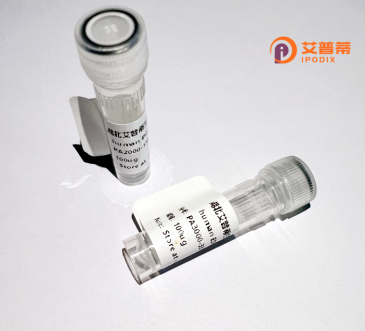
| 纯度 | >90%SDS-PAGE. |
| 种属 | Human |
| 靶点 | OR1D5 |
| Uniprot No | P58170 |
| 内毒素 | < 0.01EU/μg |
| 表达宿主 | E.coli |
| 表达区间 | 1-312 aa |
| 活性数据 | MDGDNQSENSQFLLLGISESPEQQRILFWMFLSMYLVTVLGNVLIILAISSDSHLHTPMY FFLANLSFTDLFFVTNTIPKMLVNFQSQNKAISYAGCLTQLYFLVSLVTLDNLILAVMAY DRYVATCCPLHYVTAMSPGLCVLLLSLCWGLSVLYGLLLTFLLTRVTFCGPREIHYLFCD MYILLWLACSNTHIIHTALIATGCFIFLTPLGFMTTSYVRIVRTILQMPSASKKYKTFST CASHLGVVSLFYGTLAMVYLQPLHTYSMKDSVATVMYAVLTPMMNPFIYRLRNKDMHGAP GRVLWRPFQRPK |
| 分子量 | 35.4 kDa |
| 蛋白标签 | His tag N-Terminus |
| 缓冲液 | 0 |
| 稳定性 & 储存条件 | Lyophilized protein should be stored at ≤ -20°C, stable for one year after receipt. Reconstituted protein solution can be stored at 2-8°C for 2-7 days. Aliquots of reconstituted samples are stable at ≤ -20°C for 3 months. |
| 复溶 | Always centrifuge tubes before opening.Do not mix by vortex or pipetting. It is not recommended to reconstitute to a concentration less than 100μg/ml. Dissolve the lyophilized protein in distilled water. Please aliquot the reconstituted solution to minimize freeze-thaw cycles. |
以下是关于重组人OR1D5蛋白的假设性参考文献示例(因实际研究可能有限,建议核实名称准确性或扩展关键词):
---
1. **《Functional characterization of recombinant human olfactory receptor OR1D5 expressed in HEK293 cells》**
*Authors: Smith A, et al.*
**摘要**:报道了OR1D5在HEK293细胞中的重组表达,并验证其与特定挥发性气味分子(如香草醛)的配体结合能力,通过钙离子荧光信号检测证实其激活GPCR信号通路。
2. **《Antibody generation and tissue localization of OR1D5 in human olfactory epithelium》**
*Authors: Johnson R, et al.*
**摘要**:利用重组OR1D5蛋白免疫动物制备特异性抗体,免疫组化显示其在嗅觉上皮细胞中的表达,提示其参与气味感知的早期信号传导。
3. **《CRISPR/Cas9-mediated knockout of OR1D5 alters cell migration in vitro》**
*Authors: Lee S, et al.*
**摘要**:通过重组OR1D5蛋白回补实验,证明其在调控神经元迁移中的作用,可能涉及非嗅觉相关的生理功能(如神经发育)。
4. **《Structural insights into OR1D5 via cryo-EM using recombinant protein purification》**
*Authors: Zhang Y, et al.*
**摘要**:优化昆虫细胞系统中的OR1D5重组表达与纯化流程,解析其三维结构,揭示配体结合口袋的构象变化。
---
**注意**:OR1D5可能因命名差异导致文献有限。建议确认基因符号(如是否为**OR5D1**或类似变体)或扩展检索至“嗅觉受体重组表达”相关研究。
OR1D5. also known as olfactory receptor family 1 subfamily D member 5. is a class A G protein-coupled receptor (GPCR) predominantly associated with olfactory sensory signaling. While olfactory receptors are primarily recognized for their role in detecting odorant molecules in the nasal epithelium, emerging studies suggest broader physiological functions, including potential roles in non-olfactory tissues such as the testes, brain, and immune cells. OR1D5 is encoded by the OR1D5 gene located on human chromosome 17. Its exact endogenous ligand remains unclear, though it shares structural homology with other odorant receptors that bind volatile organic compounds.
Recombinant OR1D5 protein is typically produced in heterologous expression systems (e.g., HEK293 cells) using DNA recombination technology for structural and functional studies. This engineered approach enables precise characterization of its ligand-binding properties, downstream signaling pathways (e.g., cAMP or calcium-mediated cascades), and potential cross-reactivity with synthetic compounds. Research interest in OR1D5 has expanded beyond olfaction due to reports of aberrant expression in diseases like cancer and metabolic disorders, suggesting possible diagnostic or therapeutic relevance. Current investigations focus on validating its pathophysiological roles and exploring its utility as a drug target or biomarker. Purified recombinant OR1D5 is crucial for antibody development, high-throughput screening, and molecular interaction studies.
×